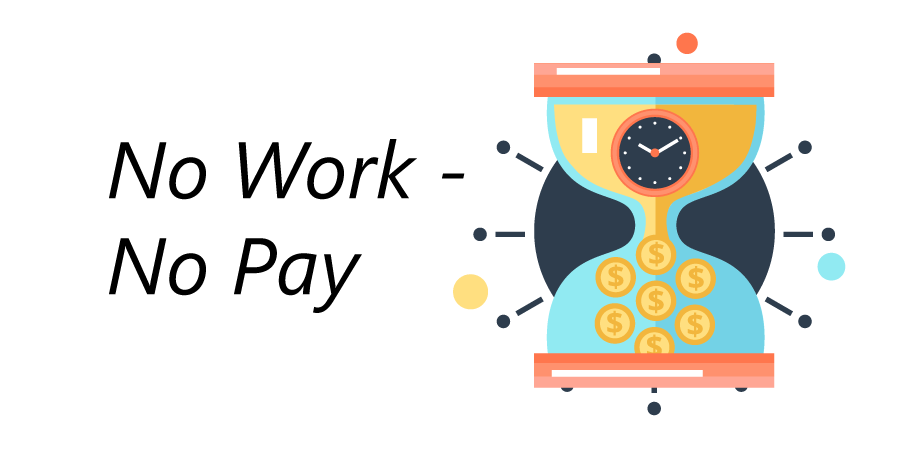
Ishani Sinha
Biograpgy

Employers and employees are the two wheels of the engine of an organization which help it to prosper but the outbreak of the pandemic has led to the disequilibrium between them and the world has been irrevocably altered. Since then India’s business sector of the economy has been exposed to a multitude of challenges. Contrary to the orders and advisories issued from time to time by the government to secure employees’ livelihood, the employers have restored to the policy of no work-no pay.
The countrywide lockdown since March 25th has had serious consequences for the socio-economic condition of the labourers. Particularly on the employment front, India’s economy is in a low growth phase as a consequence of which, the employers have started following the no work-no pay policy which means that if the employee does not come to work without giving any justification, then the employee is not entitled to salary compensation.
Under the prevailing situation, the Ministry of Labour and Employment Government of India in its order dated 20th March advised the employers to extend their coordination towards the employees (particularly contractual and casual workers) by neither terminating them from their jobs nor reducing their salaries and also the Ministry of Home Affairs(MHA) in its order dated 29th, March 2020 stated: “all the employers, be it in the industry or in the shops and commercial establishments, shall make payment of wages of their workers, at their workplaces, on the due date, without any deduction, for the period their establishments are under closure during the lockdown.” From the above two orders of MHA, it is clearly depicted that it strictly contradicts the policy of no work-no pay and it became the topic of a lot of debates.
Outcome of MHA Orders
A Karnataka-based company, filed a writ petition before the Supreme Court challenging the constitutional validity of the March 20th notification by the Secretary (Labour &Employment) and clause III of March 29th notification by the MHA stating both to be arbitrary, illegal, irrational, unreasonable and contrary to the provisions of law including Article 14 and Article 19(1) (g) of the Constitution of India. The Judgement was against the writ petition filed by them and it also quashed the policy of no work-no pay.
The Union Ministry of Home Affairs (MHA) has informed the Supreme Court that “financial incapacity” of an employer to pay his employee is a legally untenable ground to challenge a direction issued by a competent authority in the exercise of its statutory power and so the question of no work-no pay arises.
Thereafter on 12th May 2020, the Aurangabad Bench of the Bombay High Court observed that during this present time of COVID-19, the principle of no work-no pay cannot be made applicable by the employers as these are extraordinary circumstances and the courts cannot be insensitive to the plight of such workers face unfortunately on account of the Covid-19 pandemic.
From the above observations, it is very clearly depicted that no work-no pay cannot be upheld as the welfare of employees should also be taken into consideration.
Quashing of the Previous Orders
On 17th May, MHA published a new order stating that its previous orders of lockdown and lockdown measures would cease to have effect from May 18th 2020, which would mean that the restrictions on termination of employment and salary reduction imposed by the MHA Order dated 29th March, 2020 would no longer be applicable and any such action would be in accordance of labour laws.
Supreme Court Stand on the No Work No Pay Policy
On 4th June 2020, the Supreme Court ordered that no coercive action could be taken against employers with respect to the MHA notification compelling payment of wages to employees amid COVID-19 lockdown. Therefore there is a need to strike a balance between the employer and the employee. Hence the Supreme Court left it in the hands of the employers to decide whether they want to follow the policy of no work-no pay or not.
Inference
Under the Constitution of India, ‘Labour’ is a subject in the concurrent list where both the State and the Central Governments have competent authority to enact legislation subject to certain matters being reserved for the State, so it is in the hands of the State Governments to enact separate rules if it intends to compel an employer to pay during this period.
The doctrine of no work-no pay is a fundamental dictum for industrial relations which means that if a person is employed, it is expected that one has to complete the assigned work and if one fails in doing so then the employee is not eligible for payment of any salary. The maxim no work-no pay is not only a mere demagogic slogan but is certainly a constitutional goal. Article 39 of our constitution talks about “equal pay for equal work“ which is an extension of the no work-no pay policy.
Coronavirus has taken the globe by storm and amidst it, the MHA had issued a lot of orders and notification but out of all, the order issued on 29th March 2020 gained the most attention as it was against the norm of no work-no pay. The intent to secure the livelihood of employees is an affirmative approach by the government but the approach needs to be balanced by considering the commercial impact that COVID-19 has on the employers. Looking into the present situation and the economic condition of our country it is clearly depicted that the industries and factories have come to a standstill and have lost all their means of earning so forcing an employer to pay wages to the employees is out of the question.
Don’t you think that in this situation of global crisis the Government should issue orders and notifications by keeping in mind both the parties i.e., employers as well as employees so that a proper business equilibrium is maintained and the sustainability of the business is approached?
Drop your valuable thoughts in the comment section below.

Very good insight and also explanations of the legal aspect of the orders. Excellent write up. Keep blogging and educating people like us👏👏👌👍👍
Nice article.
Very nice Ishani…very well written considering the present scenario… as a HR person we are facing this crisis and have lots of queries….your write up has clarified many of those…well done👍
Excellent Analysis. Presenting employer and employee – both point of view.
Really good analysis.
nice article but my point is if an employee is working from home without any gap and an employer deducting salary what to do in this case, please suggest